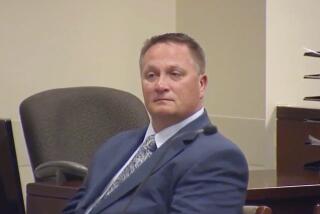Slaying of âEverybodyâs Mamaâ Stuns Neighbors
There isnât much left of the golden era of South Los Angeles; so much has been claimed by anger and frailty and poverty. But when Viola McClain was alive, you could have looked into her warm eyes, and caught a glimpse of what the community once was.
She was a pillar of her neighborhood on East 111th Street. She had lived in her Craftsman bungalow since 1935. In the backyard, she kept a garden of tomatoes and green beans. She was churchy. Bibles bedecked her front room.
Her Louisiana bonhomie was unassailable, even as the rot of the inner city gnawed away at the once-homey block in Watts where she had lived for so long. Mother McClain, they all called her, for she was âeverybodyâs mama,â as one local said, whether the child was her own kin or a wanderer from the Nickerson Gardens housing project down the street.
But of the many children sheâd reared, only one--her grandson--was with her at the time of her death. And that death, at dusk last Friday, was a testament to what had become of Mother McClainâs neighborhood in the course of her righteous life.
About 8:40 p.m., moments after McClain had gotten home from services at the Village Baptist Church, grandson Dumar Starks had a confrontation with some teenagers who were playing in the ruins of an abandoned house next door, police said.
All day, Starks recalled Tuesday as he prepared to bury his grandmother, the teenagers had been setting little fires on the property. When they dragged some old mattresses out in the yard and took a cigarette lighter to them, it was the last straw.
Starks, a 33-year-old office temporary worker, said the abandoned rental had been an eyesore for at least a year. Junkies crawled in and out of the broken windows. Neighbors complained to the police, to City Hall, to whoever would listen. Occasionally arrests were made, but the house remained a festering blight.
So, after some hours, Starks said, he marched next door to confront the boys. When he asked why they were setting fires, he said, they looked at him coldly and replied, âBecause we can.â
Then one youth, who couldnât have been more than 16, pulled a semiautomatic pistol from the waistband of his pants and loaded a round into the gunâs chamber, Starks said.
Starks told police that he ran for his house, dived inside and grabbed his gun. But his grandmother, who by this time had come home--and indeed, had counseled him to let the incident pass--had stepped out onto the porch. And into the teenagersâ line of fire.
Starks said that when he went outside, he found his grandmother crumpled and bleeding from a bullet wound in her neck. She died in an emergency room. She was 82. No suspects have been arrested.
Now, in the heart of Watts, hard between the housing projects and the Village Baptist Church, Mother McClainâs neighbors mourn the loss of what was best about their past--and reel under the realization of what is most deeply troubling about their future.
As her family selected a white-and-gold casket, a neighborhood organization announced a public vigil for 7:45 tonight at her home in the 1300 block of East 111th Street.
To McClainâs family, which stretches all the way to great-great-grandchildren, her death spoke volumes about the way society has failed to return the decency of its kindest hearts.
âThey can put a man on the moon,â said one grandson, Dorian Murphy, 46, as he sat bitterly in the funeral home, âbut they canât control the crime situation.â
Los Angeles was a different place when Viola McClain arrived from Louisiana in 1926. Her children remember a country town where people kept cows in their yards and looked out for each other.
âIt was the kind of place,â one daughter said, âwhere if a kid was bad, first the person who caught them would spank them, and then theyâd go home and get spanked again.â
As decades passed, however, Watts changed, and so did the neighborhood. The projects went up, and property values declined. The daughter said she moved out in 1950, and for the next 4 1/2 decades the family repeatedly begged McClain to leave the block. One son even offered to buy her a house in a San Gabriel Valley suburb, but she refused to leave her house and her beloved church.
By the time of her death, the family said, they had given up and comforted themselves with the thought that her grandson, Starks, was there to watch over her.
But the grandson knew otherwise.
âIâll let you in on a little secret,â he said. âI didnât take care of my grandmother. My grandmother took care of me.â
A soft-spoken, smartly dressed man, he sat on her brown velour sofa Tuesday, surrounded by knickknacks and china teacups, and numbly recalled the way she had tried to persuade him to ignore the kids next door.
âShe said, âDumar, you canât change these people,â â he recalled. âThose were her last words to me.â
Now those words gnaw at him; he can no more let them go than he could ignore those punks last Friday at the house next door. He vows to leave California. He vows to change, to gain control over his temper.
âSince this happened, I feel terrible. Absolutely numb,â he said. âIâve been visualizing my grandmotherâs face, and talking to myself. I want to be nice and sweet like her.â
Outside, in McClainâs neighborhood, similar vows are being made by the vigilâs organizers.
âWhat this says is that our kids are in trouble and this is no time to run and hide,â said Anthony Davis of Watts Youth in Action, a group whose leaders knew McClain well. âItâs time to take a child and get busy. I think Mother McClain would have wanted to find out what the problem was, and help.â
Times staff writer Shawn Hubler contributed to this story.
More to Read
Sign up for Essential California
The most important California stories and recommendations in your inbox every morning.
You may occasionally receive promotional content from the Los Angeles Times.










